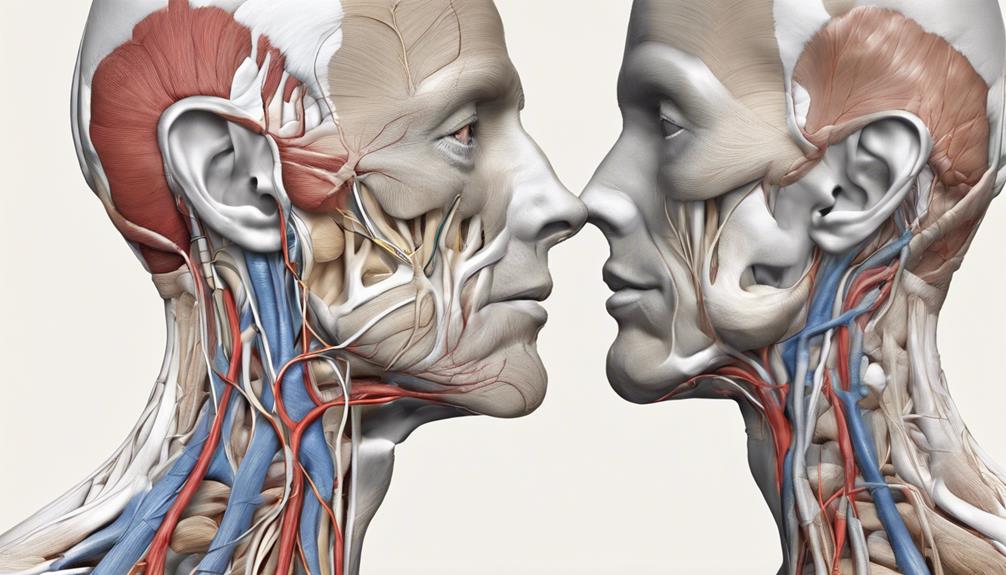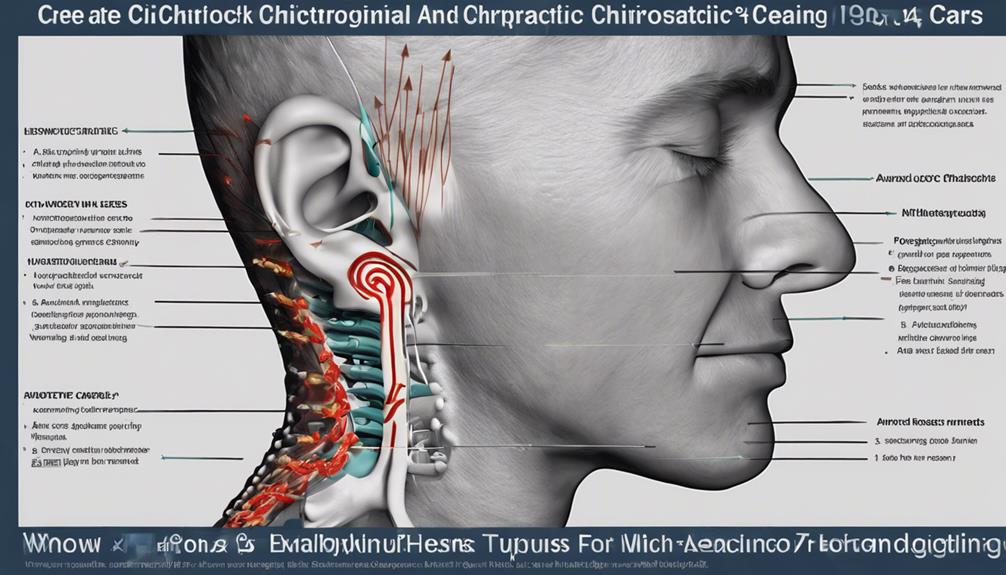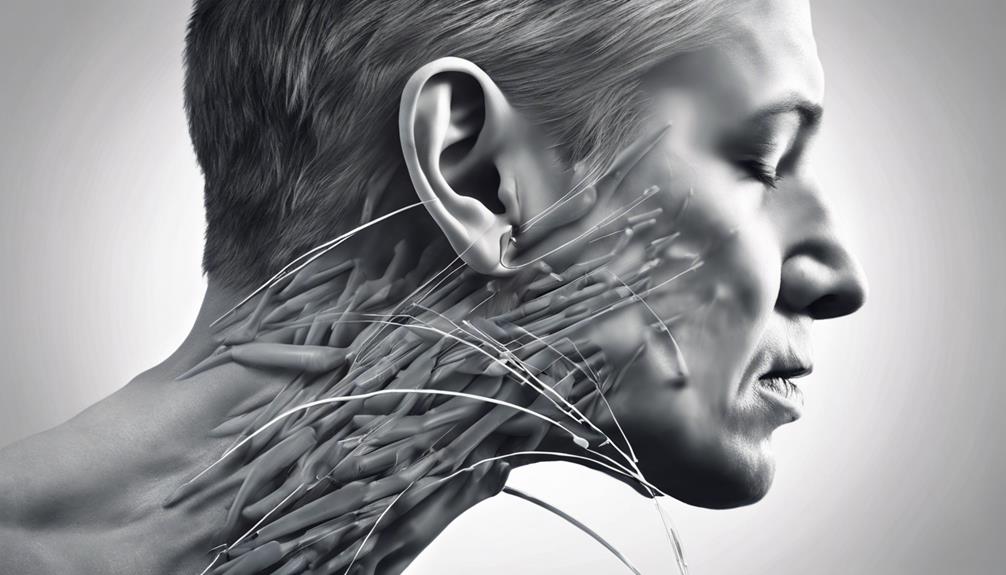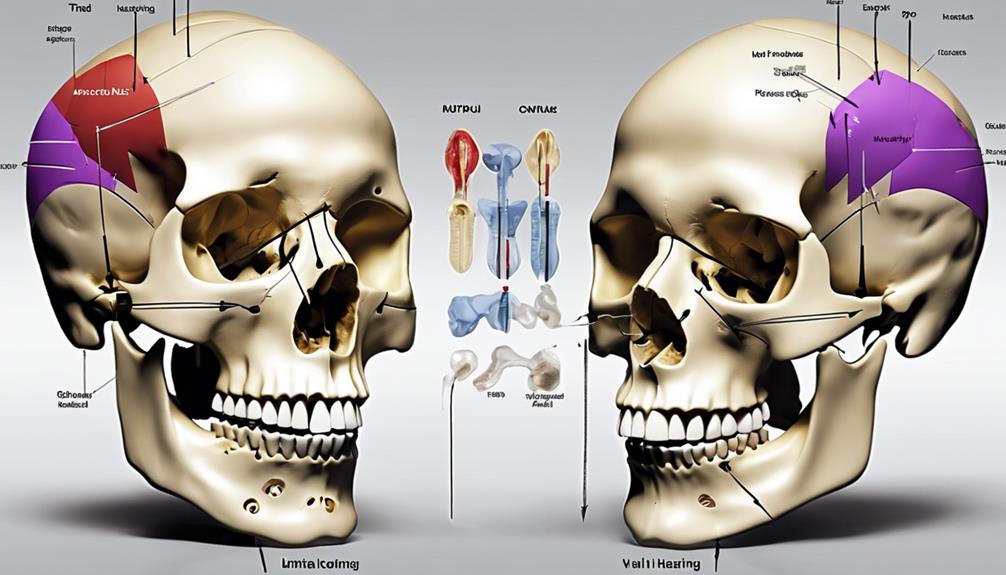Imagine a perfectly coordinated symphony where every instrument is essential in creating a harmonious sound. Just like a single out-of-tune violin can disrupt the entire orchestra, a problem with the neck can surprisingly impact one’s hearing.
As we explore the intricate link between neck health and hearing loss, we uncover surprising connections that might make you reassess how you perceive these two seemingly unrelated aspects of our well-being. Understanding this relationship could shed light on previously overlooked solutions to hearing issues, making the journey ahead worth the exploration.
Key Takeaways
- Cervical spine issues can disrupt nerve and blood flow connections crucial for hearing.
- Misaligned vertebrae in the neck can interfere with auditory signal transmission.
- Neck problems like spinal misalignments and injuries can lead to hearing impairments.
- Chiropractic care for neck issues can improve nerve function and alleviate hearing-related problems.
Anatomical Connections Between Neck and Ears
The cervical spine, which houses nerves connecting to the ears, plays a crucial role in influencing hearing function. Misalignment in this area can disrupt blood flow to the ears, impacting overall hearing health.
When the cervical spine experiences injury or trauma, it can interfere with the transmission of nerve signals to the auditory system, leading to potential hearing issues. This connection between the cervical spine and the ears is significant due to the proximity of the spine to the inner ear structures.
Proper alignment of the cervical spine is essential for ensuring optimal nerve function related to hearing. Therefore, maintaining the health and alignment of the cervical spine is vital for preserving hearing abilities and preventing potential hearing impairments.
Understanding the intricate relationship between the cervical spine, its nerves, and the ears provides valuable insights into the mechanisms that can influence hearing health.
Mechanisms of Hearing Impairment

Exploring the intricate connection between the cervical spine and hearing function reveals the underlying mechanisms responsible for potential hearing impairments. When cervical spine problems arise, several mechanisms can contribute to hearing impairment:
- Misalignment in the cervical spine: This can affect blood flow to the ears, potentially leading to hearing difficulties.
- Nerve compression: Compression in the neck area can disrupt the transmission of auditory signals, resulting in hearing loss.
- Reduced mobility in the cervical spine: Limited mobility can impact the muscles and tissues involved in hearing function, affecting auditory perception.
- Vertebral artery compression: Neck issues can compress vertebral arteries, reducing blood flow to the inner ear and impairing hearing.
- Structural changes: Alterations in the cervical spine's structure can interfere with the proper functioning of the auditory system, contributing to hearing challenges.
Understanding these intricate relationships sheds light on how cervical spine issues can intricately affect hearing function.
Impact of Cervical Syndrome on Hearing
Unveiling the intricate relationship between cervical syndrome and hearing, how does this connection impact our auditory health?
Vascular issues such as vertebral artery stenosis and nerve problems within the cervical spine can directly contribute to hearing loss.
When the cervical spine experiences spinal misalignments, it can result in neck pain, which may subsequently lead to hearing issues.
These spinal misalignments not only affect the neck but can also impact hearing health, potentially leading to conditions like tinnitus.
Furthermore, injuries to the cervical spine can have repercussions on the muscles and organs in the head, potentially causing hearing problems.
It's crucial to understand cervical syndrome as it can manifest as neck pain and eventually result in hearing impairment.
Role of Chiropractic Care

Considering the potential benefits of chiropractic care in addressing cervical spine misalignments associated with hearing issues, exploring this avenue could offer promising solutions for auditory health. Chiropractic care plays a crucial role in enhancing overall body wellness, potentially benefiting hearing health through various mechanisms. Here are five key ways chiropractic care can positively impact hearing health:
- Improving Blood Flow: Chiropractic adjustments can enhance blood circulation in the cervical spine, supporting better oxygen and nutrient delivery to the ears.
- Enhancing Nerve Function: By aligning the cervical spine, chiropractic care may optimize nerve function, potentially improving communication between the brain and ears.
- Reducing Inflammation: Seeking chiropractic care for neck problems can lead to reduced inflammation in the cervical region, which may indirectly benefit hearing.
- Supporting Spinal Alignment: Regular chiropractic sessions can help maintain proper spinal alignment, potentially alleviating neck-related issues that impact hearing.
- Enhancing Overall Body Wellness: Chiropractic care can contribute to overall body wellness, which may have positive effects on hearing health.
Preventing Hearing Loss From Neck Injuries
Neck injuries pose a significant risk to hearing health due to their potential impact on the cervical spine and its close relationship with the inner ear structures. To prevent hearing loss resulting from neck trauma, it is crucial to prioritize proper care and prevention strategies. Maintaining the health of the cervical neck region is paramount in safeguarding against potential hearing problems. When the cervical spine is injured, blood flow to the ears can be compromised, leading to issues with auditory function. Additionally, nerve pathways crucial for hearing can be affected by misalignments in the neck vertebrae, potentially resulting in inner ear damage and subsequent hearing loss. By focusing on preventing neck injuries and ensuring the well-being of the nervous system, individuals can take proactive measures to protect themselves from the detrimental effects of neck trauma on hearing.
| Neck Trauma | Hearing Problems |
|---|---|
| Blood Flow Compromised | Nervous System Affected |
| Inner Ear Damage | Preventing Hearing Loss |
Frequently Asked Questions
How Can I Improve My Hearing Loss From Nerve Damage?
We can improve hearing loss from nerve damage through various treatment options, including chiropractic care. Chiropractic adjustments may enhance nerve function, potentially leading to better hearing abilities.
Seeking this non-invasive approach can address spinal misalignments and improve blood flow, contributing to overall auditory improvements. By focusing on nerve damage, chiropractic care offers a holistic way to enhance hearing clarity and sensitivity.
Can Degenerative Disc Disease Cause Hearing Loss?
Yes, degenerative disc disease can cause hearing loss. When discs in the cervical spine deteriorate, nerve compression may occur, affecting the signals sent to the brain for processing sound. This nerve dysfunction can lead to potential hearing issues.
Seeking treatment for degenerative disc disease is crucial to prevent further complications, including hearing loss. The impact on surrounding structures, such as nerves related to hearing, underscores the importance of addressing this condition promptly.
Which Cervical Nerve Affects Ear?
We must understand that the cervical nerve that affects the ear is the cervical nerve C2. This nerve is crucial for transmitting sensory information from the upper neck to the brain.
It has connections to the inner ear structures, impacting hearing function. If cervical nerve C2 is irritated or compressed due to neck issues, it can lead to hearing disturbances.
Recognizing this link is vital for diagnosing and treating hearing problems related to neck conditions.
What Virus Causes Sudden Hearing Loss?
When it comes to sudden hearing loss, various viruses can be culprits. The herpes simplex virus, cytomegalovirus (CMV), and varicella-zoster virus are known to cause this issue. These viruses can trigger inflammation in the inner ear, impacting our hearing abilities.
Sudden sensorineural hearing loss (SSNHL) can be a consequence of these viral infections affecting the auditory system. Seeking prompt medical attention is vital to pinpoint the specific viral cause behind sudden hearing loss.
Conclusion
In conclusion, understanding the intricate relationship between neck problems and hearing loss is essential for maintaining overall health and well-being.
By recognizing the anatomical connections between the neck and ears, addressing cervical syndrome promptly, and considering chiropractic care as a holistic approach, we can prevent potential hearing impairment caused by neck injuries.
Let's prioritize our neck health to safeguard our hearing and enhance our quality of life.










